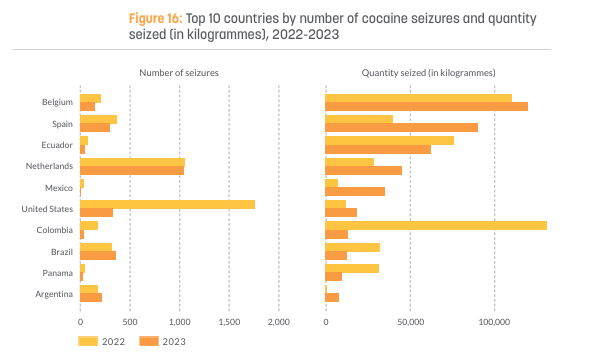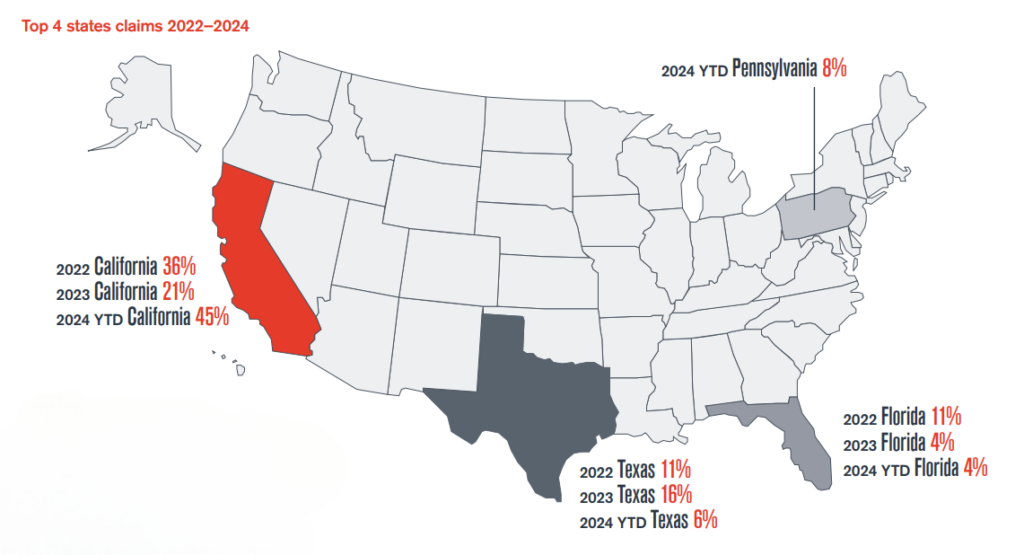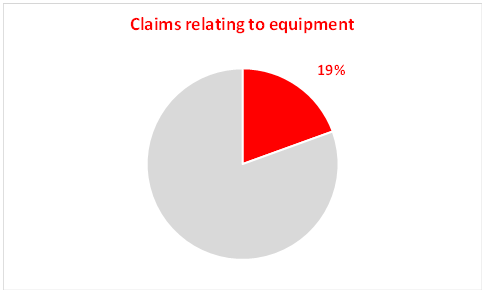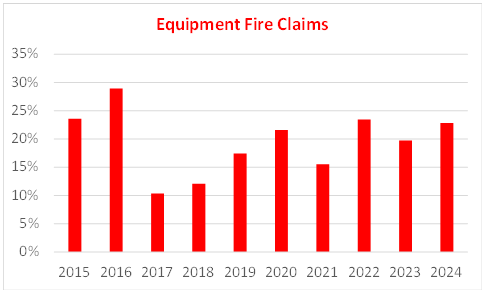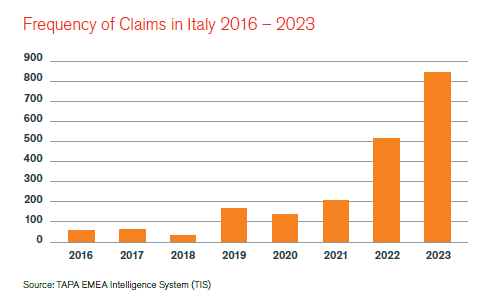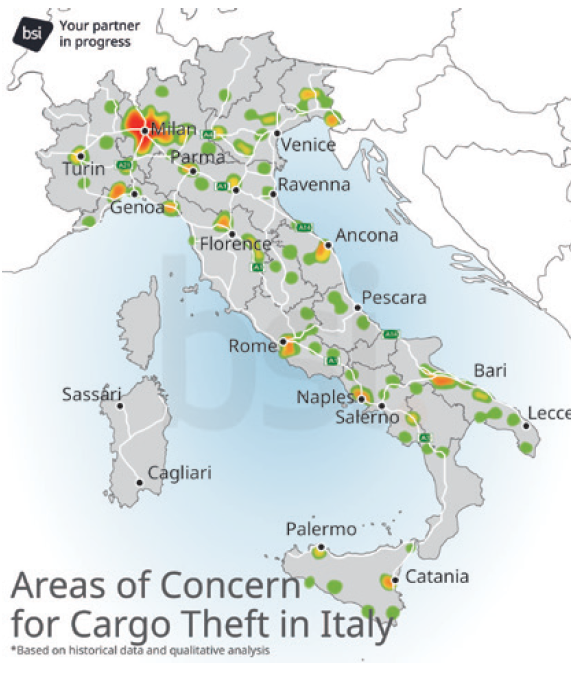The BSI Consulting and TT Club 2024 Cargo Theft Report gives a detailed analysis of targeted commodities, prime locations for theft, regional hotspots and evolving strategies employed across the world. Detailed case studies are outlined and risk mitigation advice proffered.
London, 23April, 2025
Of incidents analysed:
- Food and beverages were most frequently stolen — 22%
- 76% involved trucks, including 21% hijackings and 20% theft of vehicles
- Nearly half occurred when cargo was in transit
- Theft from facilities was down from a quarter in 2023 to 18%
- Hotspots included Brazil, Mexico, India, USA, Germany, Chile and South Africa
- ‘Strategic’ theft was the standout growth trend
- Internet-enabled crime also continues as a significant facilitator
While the Report’s statistical analysis of cargo theft types and top commodities stolen year on year (see graphic below) is revealing, it is the qualitative information and insight into the methods used by criminal that is most useful in combatting theft.
As Tony Pelli, Global Practice Director for Security & Resilience at BSI Consulting, “The growth in strategic crime, defined as that utilizing deception, fraud, and advanced planning is the most remarkable finding in our Report. This weapon in the criminals’ ever-evolving armament now involves impersonation and document forgery as well as leveraging AI technologies to manipulate bills of lading and orchestrate remote operations. The degree of sophistication employed shows that organised crime’s knowledge of supply chain vulnerabilities is deepening.”
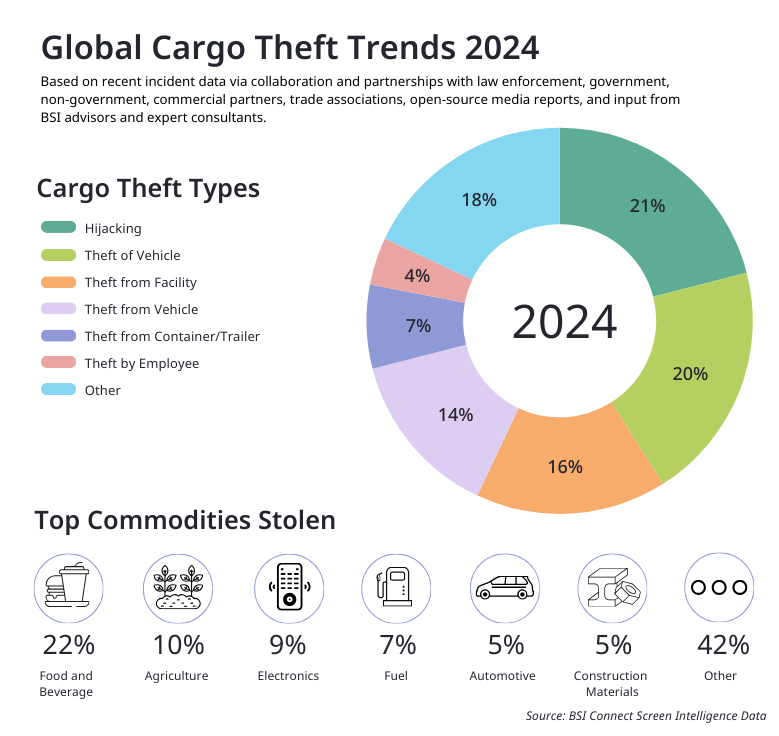
This strategic methodology was particularly noted in the US where 18% of all incidents were identified as a strategically planned thefts. Indeed, one of the Report’s detailed case studies itemises an organised crime’s campaign of theft from railcars in California and Arizona using such tactics. Elsewhere case studies help cargo owners and transport operators put real-life flesh on the statistical bones; including metal theft in South Africa, pharmaceuticals targeted in India, violent hijackings in South America and theft from trucks on the move (so-called ‘rollover’ theft’) prevalent in Europe.
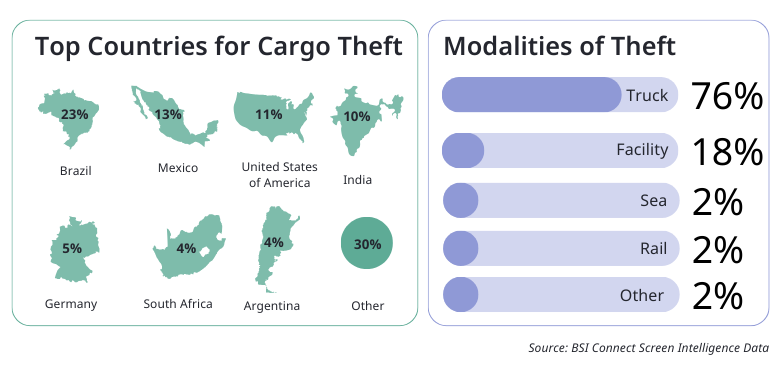
On behalf of TT, Mike Yarwood, Managing Director, Loss Prevention comments, “Our prime focus is to inform providing actionable insight to assist with risk mitigation. In this regard, it is vital to track current trends in criminal activity. The burgeoning use of the internet, though available for nefarious action for some years, is constantly spawning new technologies and should not be overlooked. Techniques such as harnessing AI to create phishing emails, deep fakes, and malware aimed at accessing sensitive freight information and reports of attacks targeting cloud-based storage services are becoming more common.”
“If it is too good to be true, then it probably is” – is the essence of the sound advice offered by BSI Consulting and TT to those in the supply chain open to the risk of theft. In a concluding section of the Report there is a comprehensive list of strategies to employ in risk mitigation, in particular to protect assets from theft. These range from care over the security of email and other electronic communication to screening and vetting of third-party contractors; also from monitoring and response through reliable tracking services to keen awareness of alterations to regular delivery and pick-up locations.
“Above all,” emphasises Yarwood, “An overarching strategy to protect against cargo loss must be based on robust due diligence. To know and trust as much as possible customers, carriers and contractors alike and to be cognisant of the criminals’ intent and level of cunning.”
SI Consulting and TT Club 2024 Cargo Theft Report is available for download free of charge BSI Consulting and TT Club 2024 Cargo Theft Report – TT Club
About TT Club
TT Club is the established market-leading independent provider of mutual insurance and related risk management services to the international transport and logistics industry. The Club’s services include specialist underwriting, claims management and risk and loss management advice, supported by a global office network. TT Club’s mission is to make the industry safer, more secure and more sustainable.
Established in 1968, TT Club currently services more than 1400 Members – container owners, operators, ports, terminals and logistics companies. Its membership covers the entire logistics journey, working across maritime, road, rail, and air ranging from some of the world’s largest logistics operators to smaller, bespoke companies managing similar risks. The Club is renowned for its high-quality service, in-depth industry knowledge and enduring Member loyalty. Its average annual customer retention rate is consistently over 95%, with some Members having chosen to insure with the Club for over 50 years.
TT Club is managed by Thomas Miller – an independent and international provider of insurance, professional and investment services. www.ttclub.com
About BSI Consulting
BSI Consulting enables clients’ sustainable growth by empowering their people and strengthening their physical and digital assets, upstream and downstream within the supply chain. Our diverse client base is wide-reaching, spanning across healthcare, pharma, manufacturing, government/public agencies, ICT, and more. A large percentage of our clients are Fortune 50 and Fortune 500 companies, showcasing our expertise in serving some of the world’s most influential organizations.
To learn more, please visit: www.bsigroup.com/consulting-us
About BSI Consulting Supply Chain Security Solutions
Our comprehensive supply chain resilience program integrates sustainability at every level, focusing on four key areas: strategy, assessment, monitoring, and response. By aligning strategic goals, addressing vulnerabilities, continuously monitoring risks, and enabling rapid, sustainable responses, consulting ensures a secure, resilient, and environmentally responsible supply chain that extends across all suppliers and operations.
To learn more, please visit www.bsigroup.com/en-US/products-and-services/consulting/supply-chain-security-risk/







